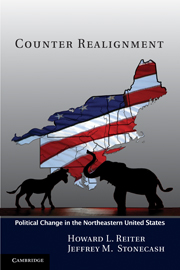Book contents
- Frontmatter
- Contents
- List of Figures
- List of Tables
- Preface
- Acknowledgments
- Postscript: Democratic Fortunes in the Northeast in 2010
- 1 Party Strategies and Transition in the Northeast
- 2 Party Pursuits and the Sources of Change
- 3 The First Republican Losses
- 4 Searching for a Majority, the Rise of Conservatives, and Second Losses
- 5 Interpreting the Goldwater Election and Pursuing the South
- 6 Social Change, Party Response, and Further Republican Losses
- 7 National Parties and the Position of the Northeast
- 8 The Process of Change and the Future
- Index
- References
5 - Interpreting the Goldwater Election and Pursuing the South
Published online by Cambridge University Press: 05 June 2012
- Frontmatter
- Contents
- List of Figures
- List of Tables
- Preface
- Acknowledgments
- Postscript: Democratic Fortunes in the Northeast in 2010
- 1 Party Strategies and Transition in the Northeast
- 2 Party Pursuits and the Sources of Change
- 3 The First Republican Losses
- 4 Searching for a Majority, the Rise of Conservatives, and Second Losses
- 5 Interpreting the Goldwater Election and Pursuing the South
- 6 Social Change, Party Response, and Further Republican Losses
- 7 National Parties and the Position of the Northeast
- 8 The Process of Change and the Future
- Index
- References
Summary
The results of the 1964 election were clear, but their interpretation was not, and the differing views reflected the growing split within the Republican Party. Lyndon Johnson received 61.1 percent of the national popular vote and House Democratic candidates received 57.4 percent of the national vote. Democrats won 26 of 33 Senate contests. The loss was seen by many as a disaster for Republicans. Goldwater's position had apparently defined the party to many voters and they did not like what they heard. As James Reston of The New York Times put it, “He has wrecked his party for a long time to come.” Another columnist wrote, “The election has finished the Goldwater school of political reaction.” There were immediate efforts to replace the conservative party leadership that Goldwater had brought in.
The election had a devastating effect within the Northeast. In the elections from 1954 through 1962, Republicans had won an average of 54.7 percent of House seats within the region, ranging from 49.1 percent to 62.9 percent. Following the 1964 election, the party held 36.7 percent of House seats, lower than their prior low of 37.4 percent in 1936. Goldwater averaged 31.2 percent of the vote in northeastern House districts and lost all ten states by wide margins. There were nine Senate seats up for election in the region, and Republicans won only two of them, both by small margins. There was little positive news in the results for northeastern Republicans.
- Type
- Chapter
- Information
- Counter RealignmentPolitical Change in the Northeastern United States, pp. 81 - 100Publisher: Cambridge University PressPrint publication year: 2011

